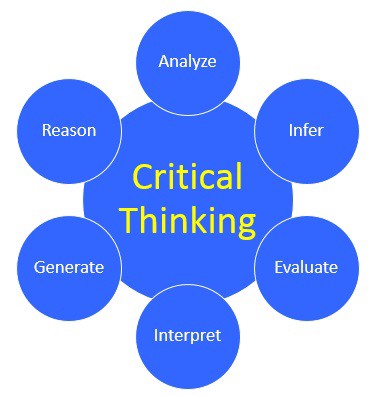Encouraging critical thinking in children

Encouraging critical thinking in children is an important life skill which is beneficial to learn from a young age.
Researcher Ellen Galinsky identifies the ‘Seven Essential Skills Every Child Needs’ in ‘Mind in the Making’ theory. She suggests that ‘to navigate the world, children need to focus, to determine what is important and to pay attention to this, amid many distractions. Focus is one of the essential skills we need to promote in our children.’
Channelling the executive functions of the brain helps us manage our attention, emotions and behaviour, in order to reach our goals. This is why it is useful to introduce critical thinking in children, in order to form concepts and judgements.
‘It is clear that there is information children need to learn – facts, figures, concepts, insights, and understandings. But we have neglected something that is equally essential – children need life skills.’
The 7 Critical Thinking Skills:
Focus and self-control
Blocking out distractions and learning to focus is a skill needed throughout education. This involves focusing on goals and grasping concepts that are taught by focusing undivided attention on what is being taught.
Provide opportunities for play
Figuring out how things work through play. Learning cause and effect, creating different reactions through different modes of play. This is how hands-on learning helps with developing critical thinking.
Pause and wait
Providing time to think and reflect upon the task or activity they are completing. It is important to let children have time to work out solutions for themselves before assisting.
Don’t intervene immediately
Wait and allow time to encourage children to learn for themselves before giving them a hand. This helps them develop executive functioning skills, a range of skills that help with staying focused and self-monitoring.
Ask open-ended questions
Instead of providing the answers to questions children ask, try and help them by asking what they think the answer could be. This aids with critical thinking, as they will learn to become inquisitive and think rationally instead of asking for the answer. Encourage children to think about what they have asked and what they think about it.
Help children develop hypotheses
Inspire learning by encouraging children to investigate further, whether it’s for educational purposes or for reflective thinking. Ask why they’ve come to a certain conclusion, whilst thinking about the learning journey.
Encourage thinking in new and different ways
Innovative thinking helps to develop children’s problem-solving skills. Help them to form their own views and opinions by questioning their processes and methods. Monitoring their learning and thinking of new ways to learn and considering all of the solutions of the learning process will change the way they think, encouraging critical thinking.
Encouraging critical thinking in children helps them to be driven by learning goals. It’s a method that involves using memory to keep a number of different concepts in mind at the same time, whilst paying attention, thinking flexibly and avoiding going on automatic pilot. Through applying all seven executive functions, it allows us to monitor feelings and thinking so we can ‘reflect, analyse, plan and evaluate.’
If you’re interested in Ellen Galinsky’s ‘Seven Essential Skills Every Child Needs,’ read more about it here.
Wondered how to make learning fun for children? Find out more on our blog.
